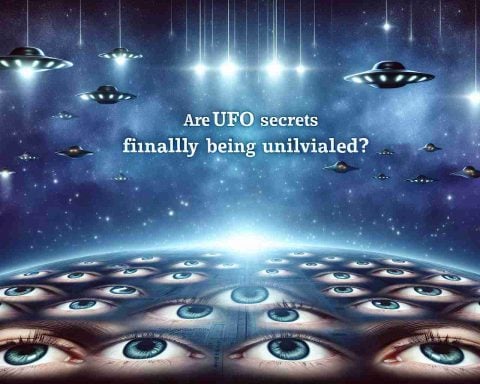- The House Oversight Committee is investigating America’s enigmatic issues, including UFOs, Epstein’s client list, and 9/11 mysteries.
- Efforts are underway to obtain briefings from key agencies like the CIA and NSA to uncover hidden secrets.
- An executive order demands the release of intelligence on historic assassinations, raising hopes for new insights.
- While documents are typically declassified after 10 to 25 years, some remain secret due to national security or diplomatic concerns.
- The task force aims to increase transparency and public trust by revealing longstanding classified information.
- This initiative seeks to bridge the mistrust gap between citizens and government institutions by bringing hidden truths to light.
A wave of curiosity sweeps through the corridors of power as the House Oversight Committee embarks on an ambitious quest to illuminate America’s most cryptic enigmas. Tasked with unraveling legends like UFOs, Jeffrey Epstein’s client list, and the shadowy veil over 9/11, the Committee stands on the precipice of a new era of transparency.
The skies of Washington buzz with anticipation as letters dart to the CIA, NSA, and various Departments, demanding briefings on any guarded secrets. This move comes hot on the heels of an executive order calling for disclosure of intelligence on the historic assassinations of JFK, RFK, and MLK, sparking hopes for revealing insights hidden away in dusty vaults.
For years, due to their sensitive nature, many files have remained shackled, locked away from the public eye. Classified documentation is expected to ‘see the light’ 10 to 25 years after its creation, but some records defy this norm, protected by veils due to threats to national security or delicate diplomatic ties.
But now, a different drum beats—a demand for truth. Under the guiding hand of Oversight Committee leaders, the task force aims to break down these barriers, visible only by the shadow they cast, and recast them in the gleaming light of public scrutiny. The atmosphere crackles with a newfound longing for answers—a promise of unveiling what has long been stitched into the dark fabric of national history.
As Americans tune in with bated breath, the potential declassification represents not just an administrative act but a beacon of hope. The task force aims to close the gaping chasm of distrust between citizens and their institutions, promising a revelation of truths long-held and long-sought.
Revealing America’s Secrets: The Quest for Truth Unfolds
The House Oversight Committee’s recent initiative has opened a promising avenue towards transparency and truth, seeking to shed light on some of America’s most enigmatic issues. This move encompasses investigations into subjects like UFOs, Jeffrey Epstein’s client list, and the mysteries surrounding the events of 9/11. Such efforts have ignited widespread anticipation and interest, as they could potentially reshape public understanding and trust.
Implications of the Declassification Efforts
1. Impact on National Security:
– The declassification of sensitive information could have complex consequences. While transparency is a democratic virtue, it’s essential to tread carefully to ensure that no harm befalls ongoing national security operations or diplomatic relationships. Historical precedence shows that revealing certain classified information can strain international ties or expose vulnerabilities.
2. Public Perception and Trust:
– The potential unveiling of previously hidden information has the capacity to bridge the trust gap between the public and the government. Citizens often harbor skepticism towards governmental institutions due to perceived concealments. This process could either strengthen faith in governmental transparency or, if mishandled, exacerbate distrust.
3. Technological and Scientific Revelations:
– The disclosure of UFO-related data could have profound implications for science and technology. There might be partnerships with private sectors or academic institutions that could capitalize on previously undisclosed research or findings.
4. Historical Reevaluation:
– New information regarding historical events such as the assassinations of JFK, RFK, and MLK might reshape historical narratives. Such revelations could foster a more nuanced understanding of these pivotal moments in American history.
5. Future Legislation and Governance:
– Successful declassification initiatives could set a precedent for future governance, emphasizing openness and accountability. This might encourage legislators to craft laws that streamline the declassification process and implement checks and balances to mitigate the misuse of classified designations.
Critical Questions and Answers
– Why has the declassification of these documents been delayed for so long?
Classified documents are often kept secret to protect national security and diplomatic interests. Certain records, initially meant to be disclosed within 10 to 25 years, are withheld due to ongoing threats that disclosure might pose.
– What methods will the Oversight Committee use to ensure these revelations do not compromise security?
The Committee collaborates with intelligence agencies to evaluate which documents can be safely disclosed without undermining national interests, ensuring a balance between transparency and security.
– How might this initiative shape future US diplomatic relations?
Should sensitive diplomatic communications be declassified, there might be shifts in how the US is perceived globally. This could either enhance or complicate diplomatic interactions, depending on the nature and the content of the disclosures.
For more updates, visit credible sources like New York Times and BBC News.
In conclusion, the House Oversight Committee’s ambitious journey towards revealing America’s secrets holds the promise of not only reshaping public trust but also influencing the global discourse. As Americans and the world watch this unfolding, the outcomes could pave the way for a more informed and transparent governance era.

















